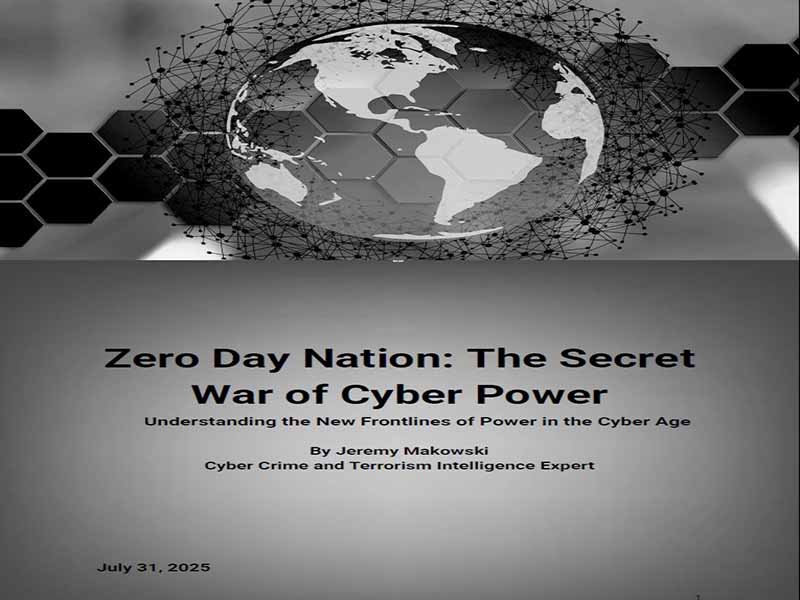- عنوان کتاب: Zero-Day Nations The Secret War of Cyber Power
- نویسنده: Jeremy Makowski
- حوزه: جنگ سایبری
- سال انتشار: 2025
- تعداد صفحه: 165
- زبان اصلی: انگلیسی
- نوع فایل: pdf
- حجم فایل: 4.80 مگابایت
قرن بیست و یکم انقلابی بیسابقه را به ارمغان آورده است که نه با بخار یا فولاد، بلکه با شبکهها، الگوریتمها و دادهها هدایت میشود. یک حوزه استراتژیک جدید پدیدار شده است: فضای مجازی. فضای مجازی که زمانی یک آزمایش خاص ناشی از همکاری جنگ سرد بین دانشگاهها و ارتش بود، به یک اکوسیستم دیجیتال گسترده و به هم پیوسته تبدیل شده است. امروزه، به اندازه زمین، دریا، هوا و فضا حیاتی و مورد مناقشه است. هر جنبهای از زندگی مدرن، تجارت، ارتباطات، حکومت، جنگ و حتی ایدئولوژی، اکنون با قلمرو دیجیتال در هم تنیده شده است. اما با این ادغام عمیق، آسیبپذیری فزایندهای نیز به وجود میآید. همانطور که زندگی ما به طور فزایندهای به سمت آنلاین شدن پیش میرود، تهدیدات نیز به دنبال آن میآیند. فضای مجازی بر روی زیرساختهای فیزیکی و منطقی ساخته شده است: کابلهای زیر دریا، ماهوارهها، روترها و پروتکلها. با این حال، به همان اندازه توسط رفتار انسان شکل میگیرد. نحوه عملکرد افراد، نهادها و جوامع به صورت آنلاین، تعیین میکند که قدرت و ریسک در این حوزه جدید چگونه تکامل مییابد. فضای مجازی به میدان نبردی تبدیل شده است که بازیگران مختلفی از جمله شرکتها، مجرمان و دولتها در آن حضور دارند. از جمله فعالترین آنها مجرمان سایبری هستند: سازمانیافته، چابک و جهانی. آنها با فعالیت از طریق کانالهای رمزگذاری شده و بازارهای وب تاریک، از نقاط ضعف دیجیتال با استفاده از فیشینگ، باجافزار، جاسوسافزار و نقض دادهها سوءاستفاده میکنند. عملیات آنها دائماً در حال تکامل است و تأثیر آنها گسترده است. با این حال، جرایم سایبری تنها یک بُعد است. دولت-ملتها به طور فزایندهای درگیر جنگ دیجیتال میشوند و از فضای مجازی برای خرابکاری در زیرساختها، سرقت اطلاعات، دستکاری افکار عمومی و تضعیف دشمنان بدون شلیک حتی یک تیر استفاده میکنند. قدرتهای سایبری پیشرو، از جمله ایالات متحده، چین، روسیه، ایران، کره شمالی و اسرائیل، از طریق عملیات پنهانی و اغلب قابل انکار، در حال شکل دادن به دوران جدیدی از درگیری جهانی هستند. در کنار حملات سایبری، نوعی جنگ موازی ظهور کرده است: سلاحسازی اطلاعات. کمپینهای اطلاعات نادرست، عملیات نفوذ و تاکتیکهای روانی، حقیقت را تحریف میکنند، تفرقه میافکنند و اعتماد به سیستمهای دموکراتیک را تضعیف میکنند. پلتفرمهای رسانههای اجتماعی که زمانی به عنوان ابزارهایی برای توانمندسازی دیده میشدند، اکنون به میدانهای نبرد استراتژیک برای دستکاری تبدیل شدهاند. بازیگران غیردولتی نیز نقش مهمی ایفا میکنند. گروههای افراطی، سازمانهای تروریستی و هکتیویستها از فضای دیجیتال برای جذب نیرو، گسترش تبلیغات و انجام حملات مخرب استفاده میکنند. مرز بین کنشگری و تروریسم، مخالفت و خرابکاری، روز به روز دشوارتر میشود. در این چشمانداز بیثبات، توازن قدرت جهانی در حال تغییر است. در حالی که تلاشهای بینالمللی برای اداره فضای مجازی در حال انجام است، چارچوبهای موجود همچنان ناقص و شکننده هستند. یک مسابقه تسلیحاتی جدید در حال وقوع است که نه در موشکها، بلکه در سوءاستفادههای نرمافزاری، هوش مصنوعی و نفوذ دیجیتال سنجیده میشود. فناوریهای نوظهور مانند هوش مصنوعی، محاسبات کوانتومی و شبکههای نسل بعدی، امکانات و خطرات فضای مجازی را تغییر میدهند. شرکتهای خصوصی اکنون قدرت تکنولوژیکی زیادی را در اختیار دارند و زیرساختهای حیاتی را کنترل میکنند و آنها را به بازیگران اصلی در این حوزه در حال تحول تبدیل میکنند. چالش پیش رو واضح است: چگونه میتوانیم در مواجهه با تهدیدات سایبری مداوم، تابآوری ایجاد کنیم؟ چه استراتژیها، اتحادها و تدابیر حفاظتی برای ایمنسازی این حوزه مورد نیاز است؟ و چه نوع آیندهای را عمداً یا غیرعمدی از طریق وابستگی فزاینده خود به سیستمهای دیجیتال ایجاد میکنیم؟ درک فضای مجازی برای هر کسی که به دنبال درک معماری در حال تغییر قدرت جهانی است، ضروری است. این فقط یک مسئله فنی یا نظامی نیست، بلکه یک مسئله سیاسی، اقتصادی، روانشناختی و وجودی است. درک فضای مجازی، درک قرنی است که اکنون در آن زندگی میکنیم.
The 21st century has brought a revolution unlike any before one, driven not by steam or steel, but by networks, algorithms, and data. A new strategic domain has emerged: cyberspace. Once a niche experiment born from Cold War collaboration between universities and the military, cyberspace has grown into a vast, interconnected digital ecosystem. Today, it is as vital and contested as land, sea, air, and space. Every aspect of modern life, commerce, communication, governance, warfare, and even ideology, is now intertwined with the digital realm. But with this deep integration comes growing vulnerability. As our lives increasingly move online, the threats follow. Cyberspace is built on physical and logical infrastructure: undersea cables, satellites, routers, and protocols. Yet it is shaped just as much by human behavior. How people, institutions, and societies act online determines how power and risk evolve in this new domain. Cyberspace has become a battleground populated by various actors, including corporate, criminal, and state. Among the most active are cybercriminals: organized, agile, and global. Operating through encrypted channels and dark web marketplaces, they exploit digital weaknesses using phishing, ransomware, spyware, and data breaches. Their operations are constantly evolving, and their impact is widespread. However, cybercrime is only one dimension. Nation-states increasingly engage in digital warfare, using cyberspace to sabotage infrastructure, steal intelligence, manipulate public opinion, and weaken adversaries without firing a single shot. Leading cyber powers, including the United States, China, Russia, Iran, North Korea, and Israel, are shaping a new era of global conflict through covert and often deniable operations. Alongside cyberattacks, a parallel form of warfare has emerged: the weaponization of information. Disinformation campaigns, influence operations, and psychological tactics distort truth, sow division, and undermine trust in democratic systems. Social media platforms, once seen as tools for empowerment, are now strategic battlegrounds for manipulation. Non-state actors also play a significant role. Extremist groups, terrorist organizations, and hacktivists use the digital space to recruit, spread propaganda, and launch disruptive attacks. The line between activism and terrorism, dissent and sabotage, is becoming harder to define. In this volatile landscape, the global balance of power is shifting. While international efforts are underway to govern cyberspace, existing frameworks remain incomplete and fragile. A new arms race is unfolding, measured not in missiles but in software exploits, artificial intelligence, and digital influence. Emerging technologies like AI, quantum computing, and next-generation networks are transforming cyberspace’s possibilities and risks. Private companies now wield much technological power and control critical infrastructure, making them central players in this evolving domain. The challenge ahead is clear: how can we build resilience in the face of persistent cyber threats? What strategies, alliances, and safeguards are needed to secure this domain? And what kind of future are we creating intentionally or not through our growing dependence on digital systems? Understanding cyberspace is essential for anyone seeking to grasp the shifting architecture of global power. It is not just a technical or military issue, but a political, economic, psychological, and existential one. To understand cyberspace is to understand the century we now live in.
این کتاب را میتوانید از لینک زیر بصورت رایگان دانلود کنید:





































نظرات کاربران